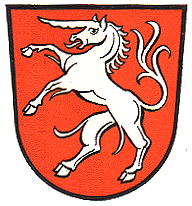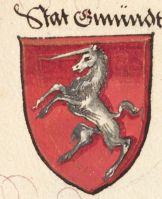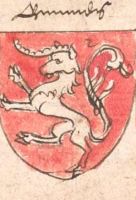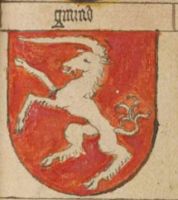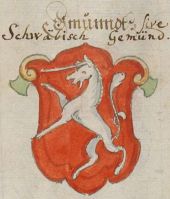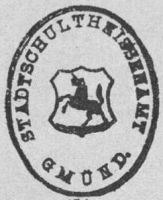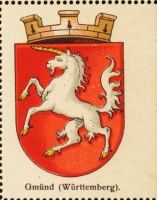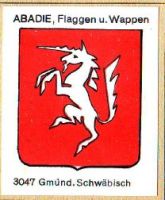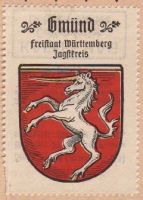Schwäbisch Gmünd: Difference between revisions
Knorrepoes (talk | contribs) m (Text replacement - "{{de1}}" to "{{de}}") |
Knorrepoes (talk | contribs) m (Text replacement - "{{media1}}" to "{{media}}") |
||
| Line 40: | Line 40: | ||
{{de}} | {{de}} | ||
{{ | {{media}} | ||
[[Category:German Municipalities S]] | [[Category:German Municipalities S]] | ||
Revision as of 07:36, 2 August 2023
SCHWÄBISCH GMÜND
State : Baden-Württemberg
District (Kreis) : Ostalbkreis (until 1973 Schwäbisch Gmünd)
Additions : 1938 Rehnenhof-Wetzgau; 1959 Bettringen; 1969 Herlikofen, Hussenhofen; 1971 Bargau, Degenfeld, Lindach, Weiler in den Bergen ; 1972 Grossdeinbach, Strassdorf; 1975 Rechberg
| German |
In Rot ein aufgerichtetes silbernes Einhorn. |
| English | blazon wanted |
Origin/meaning
The city was founded around 1160 by the Staufen family, Dukes of Schwaben. In 1260 the city became a free imperial city until 1803.
The unicorn already appears on the first known seal of the city, dating from before 1250. Ever since the seals and arms of the city have shown the unicorn. The meaning or origin of the unicorn are not clear, however. The first coloured images show a golden unicorn, since the early 17th century the unicorn is silver, sometimes still with a golden horn.
The arms in the Wappen-Sammlung (1900)
The arms in the Abadie albums
The arms by Hupp in the Kaffee Hag albums +/- 1925
Literature: Stadler, 1964-1971, 8 volumes.
This page is part of the German heraldry portal Deutsche Wappensammlung |
Heraldry of the World |
|
German heraldry:
|
Selected collector's items from Germany:
|
Contact and Support
Partners:
Your logo here ?
Contact us
© since 1995, Heraldry of the World, Ralf Hartemink 
Index of the site
